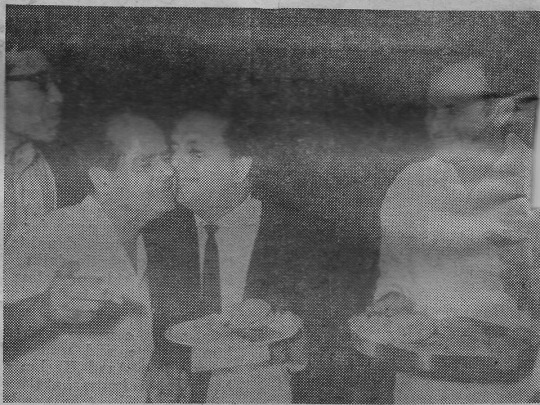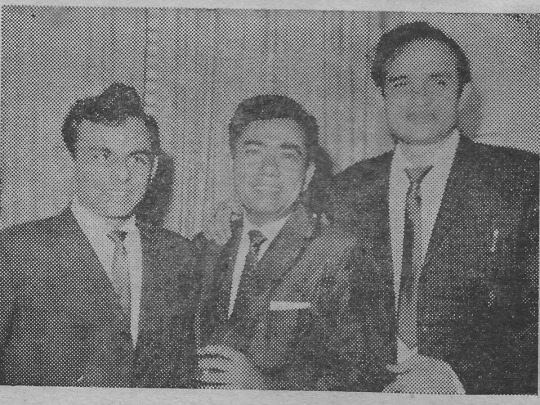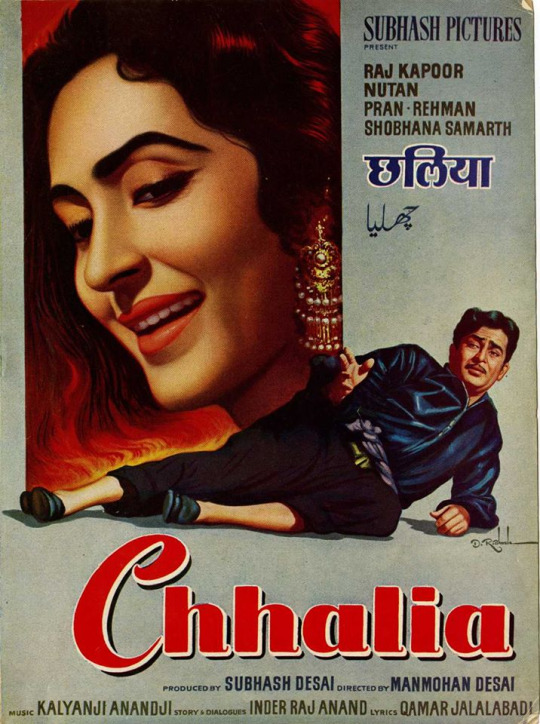#Best Duet Songs of Shailendra Singh
Explore tagged Tumblr posts
Text
Lyrics Na Chahoon Sona Chaandi
Lyrics Na Chahoon Sona Chaandi
Lyrics in English | Na Chahoon Sona Chaandi | Bobby (1973)| Rishi Kapoor | Dimple Kapadia Na Chahoon Sona ChaandiNa Chahoon Heera MotiYe Mere Kis Kaam KeNa Maangoon Bangla BaadiNa Maangoon Ghoda GaadiYe To Hain Bas Naam KeDeta Hai Dil DeBadle Me Dil KeDeta Hai Dil DeBadle Me Dil KeGhey (5)Ghey Re SaahibaPyar Me Sauda NahinGhey (5)Ghey Re SaahibaPyar Me Sauda Nahin…………. Songs Starting from…

View On WordPress
#A to Z Bollywood Songs#A to Z Hindi Songs#A to Z Song Lyrics#A to Z Songs#All Time Best Songs of Shailendra Singh#Antakshari Songs from N#Best Duet Songs of Shailendra Singh#Bollywood Songs of 1973#Dimple Kapadia Songs#Duet Songs of Manna Dey#Hindi Song Lyrics Starting from N#Hindi Songs of 1973#Kishore Kumar Songs#Lyrics Starting from N#Manna Dey Songs#Rishi Kapoor Hit Songs#Rishi Kapoor Songs#Romantic Songs of 1973#Romantic Songs of Dimple Kapadia#Romantic Songs of Rishi Kapoor#Shailendra Singh Songs#Songs composed by Laxmikant-Pyarelal#Songs from Bobby (1973)#Songs from Na#Songs Starting from "N"#Songs with Word Na#Songs Written by Vitthalbhai Patel#Superhit Songs of 1973#Top 10 Songs Written by Vitthalbhai Patel
0 notes
Text
30 June Kalyanji Virji Shah (Kalyanji-Anandji): 92nd Birth Anniversary
By

Siraj Syed
Kalyanji Virji Shah (Kalyanji-Anandji): 92nd Birth Anniversary 30 June 1928-24 August 2000
From sleeve notes written for SaReGaMa’s LEGENDS CD set in 2009: More than half a century after the cobra swayed to the clavioline, masquerading as the been, in ‘Tan dole mera man dole’, its notes still reverberate across India, and in many other parts of the world. It was, and remains, Kalyanji Virji Shah’s best-known musical signature. Kalyanji had first used the instrument in a film called Naag Panchami (1953, music Chitragupta), but that went largely un-noticed. ‘Tan dole’, a Hemant Kumar tune from a box-office hit, was the chart-topper of 1954, so listeners took good notice of its mesmerising been theme. Developed in France by a designer named Constant Martin, the clavioline was introduced in 1947. Five years later, musician Kalyanji was playing it here, in India, in film song takes. Four years after Nagin, Kalyanji had arrived as music director, with Samrat Chandragupta. And the following year, younger brother Anandji, who was a child actor and chorus singer too, joined him to create the K-A team that stood firm for over 40 years. Nevertheless, as Anandji, some four years younger (now 88), is often heard saying, “Kalyanjibhai is watching all this from above. He is very much with us in spirit.” Kalyanji Virji Shah died in the year 2000, at the age of 72.
Born in Kundrodi village of the Mundra taluka in Kutchh, the brothers grew up in Mumbai, where their father ran a food-grain store. Inclined more towards music than academics, they developed the self-taught ability to play a host of instruments, and formed part of school bands. By 1944-45, the teenager siblings had started playing in film song recordings. Big brother set up his own band in 1950, calling it Kalyanji and Party, with Purshottam Upadhyaya singing ‘Too mera chaand maen teree chaandnee’, the super-hit Naushad tune from Dillagi, to thunderous encores. The band performed in Bombay and in other nearby towns. For a while, the businessman in him did surface, and Kalyanji started a tailoring shop in partnership with a friend. Destiny, however, ensured that the shop did not prosper, drawing Kalyanji even closer to a world where a needle was something that played a gramophone record, not a device to stitch clothes with.
Many of us have heard the popular tunes the brothers composed for films like Samrat Chandragupta, Bedard Zamana Kya Jane, Chhalia and Bluff Master, the last two being the earliest directorial forays of director Manmohan Desai, but few would be aware that it was producer Subhash Desai, Manmohan’s brother, who gave Kalyanji his music directorial his break. Impressed with his prowess at song recordings of various recognised composers, Subhash saw a competent future music director in Kalyanji, and made him an offer that was strange, but nevertheless one that he could not refuse. Would he agree to a contract offering him 11 film assignments as music director, with a fee of Rs. 5,000 for the first film, Rs. 10,000 for the second…a recurring Rs. 5,000 increment per film, non-negotiable? The offer was too good to resist, so Kalyanji agreed, but he did ask Subhash, “Why11 films? Why not 10? Or 12?” The reply was convincing, “Eleven is my lucky number.” As it transpired, they did not do 11 films together, but Kalyanji’s career choice was made.
The K-A success story begins with Kalyanji’s kingly debut, Samrat Chandragupta. ‘Chahe paas ho’ is a touching lyric, with a tinge of sadness, as is the next number, ‘Door kahin tu chal’, another Rafi-Lata duet, from Bedard Zamana Kya Jaane, both penned by Bharat Vyas. With a title like Madari, there had to be a snake-charmer and his been in play, and the theme track, penned by Faruk Kaiser and rendered by Lata and Mukesh, indeed provided flashbacks of the legendary Kalyanji patent. Soon after he wrote his first song for them in Chandrasena, Gulshan Bawra penned a real gem in Satta Bazar, and this time the brothers invited their mentor Hemant Kumar to join Lata in the recording room, with amazing results. Who can forget ‘Tumhe yaad hoga’? Not yet the He Man he was to become in his later years, Dharmendra in Dil Bhi Tera Hum Bhi Tere was emoting to Mukesh’s emotion-charged playback, rendering Shamim Jaipuri’s rich poetry. Graduating from smaller set-ups into a Raj Kapoor vehicle, K-A hit big time in Chhalia. Nonsensical verse from a sensible writer, Qamar Jalalabadi, ‘Dum dum diga diga’, with Mukesh providing playback to Raj’s on-screen antics, set the aisles afire.
Soon, they were signed to compose for Mehndi Lagi Mere Haath, a Shashi Kapoor starrer, and Bluff Master. Both films enjoyed reasonable success and the music went around too. In Bluff Master, we find the rare phenomenon of four voices being used for the same actor: Mukesh, Hemant Kumar, Shamshad Begum (Shammi Kapoor in drag) and Rafi. It was Rafi who immortalised ‘Govinda ala re’ and sang the duet ‘Husn chala kuchh aisi chal’ with Lata. Anand Bakhshi wrote inspired lyrics for Phool Bane Angaare, and Mukesh, as usual, delivered them with consummate artistry. By 1964, K-A were in the Premier League. That very year, they came up with such melodious tracks as the lilting ‘Humsafar mere humsafar’ (Purnima), where they teamed up with Gulzar, a rarity, and the two Mukesh solos from Ji Chahta Hai and Himalaya Ki God Mein. The former was written by Majrooh, not a K-A regular. Another infrequent teaming worked very well, as Hasrat Jaipuri wrote and Rafi sang in great style, ‘Dil beqarar sa hai’ (Ji Chahta Hai). Melodious, hummable and catchy. A ghazal on Shammi Kapoor with Bakhshi writing and Rafi singing may not be a common occurrence, but just savour ‘Teri zulfen pareshan’ (Preet Na Jane Reet). Staying with Mukesh on Shashi, after MLMH, the duo came up with a moody duet in Juari, ‘Humsafar ab yeh safar kat jayega’. If there was still any doubt about the standing of the duo in the rankings, Jab Jab Phool Khile laid to rest all criticism. Every track was heard everywhere. The songs had it all: pathos, fun, longing, depression, pep. For both K-A and Anand Bakhshi, the success of JJPK was to remain a milestone forever.
Rafi provided playback for debutant Rajesh Khanna in the theme song of his debut vehicle, Raaz, re-uniting K-A with Shamim Jaipuri, producing haunting results. Indeevar’s lyrics sang of cruel fate in Dil Ne Pukara, and who better to voice them than Mukesh, as ‘Waqt karta jo wafa’. In the same vein was the Suhag Raat lament, ‘Khush raho’. Manna De came in to give playback for Pran in Upkar and Zanjeer, rendering two of his most acclaimed numbers. It took the duo 19 hours to record ‘Mere desh ki dharti’, the patriotic anthem of Upkar. Saraswatichandra, based on a literary classic, needed the linguistic mastery of Indeevar to weave in the songs, and the author of ‘Kasme vaade pyar vafa’ made it count. Filmfare awarded the duo for the best music of the year. It was still pristine K-A, full of melody, working with Lata and Mukesh. Another award followed some years later, for Kora Kagaz, which had a pathos-laden title-track in the voice of Kishore. Not many might realise, but K-A used Kishore Kumar for the first time in the 1968 film Suhag Raat, singing a sad song, a full decade after the duo had started their career. A comic song was rendered by Manna De while Mukesh was called-upon to put across the other sad lyric.
Only Rafi could have set swinging mood for Shashi Kapoor to gyrate on screen in ‘Nain milakar chaen churana’ (Aamne Saamne). Rafi for Shashi it was again in Ek Shriman Ek Shrimati and Raja Saab. Part of the female vocals in Raja Saab came from Suman Kalyanpur. Suman had sung for K-A in MLMH and JJPK too, and was to partner Manhar in his first hit number in Vishwas. Giving Hemlata her break in the same film, K-A paired her with good-old friend Mukesh. Soon, the duo was to show its preference for rotating the strike, training and honing a host of budding singing talent, while reverting to the established names with equal regularity. Like a lot of extremely popular Mahendra-Manoj Kumar, Kishore-Amitabh Bachchan and Kishore-Rajesh Khanna outings. Incidentally, K-A took three days to record the back-ground score of Suhaag Raat, while they needed a whole month for Purab Aur Paschim. For the ‘Om jai Jagdeesh Hare’ bhajan of PAP, the composers used 50 chorus singers to get the effect normally created by violins. They called it human resonance. Delay (natural echo) was the highlight of ‘Mere mitwa’ (Geet). The child-like double speed of ‘Na sun sun sun bura’ (Priya) was simply achieved by recording on spool-tape at a particular speed and playing it back at double the speed. Most of their work was done at the Famous, Tardeo, recording studio.
There is Rafi, and not Kishore, for Rajesh Khanna, oozing sensuality as only he could, in Chhoti Bahu: ‘Yeh raat hai pyasi pyasi’, echoing musician hero Rajendra Kumar’s heart-rending call in Geet and charting a romantic route for Dharmendra in Kab Kyon Aur Kahan? He also offers love lessons in Upaasna; in the Haath Ki Safai duet, he makes a solemn promise of eternal love; and he goes on Dilip Kumar for the intoxicating ‘Peete peete’ duet with Asha Bhosle in Bairaag. As Western as it gets is the rare title chorus ‘Pretty pretty Priya’ (Priya) and as Sanskritised as it can get is the Kishore hilarity ‘Priye praneshwari’ (Hum Tum Aur Woh). Kalyanji-Anandji made Shatrughan Sinha sing in Kashmakash, Amitabh Bachchan in Laawaris and Anil Kapoor in Chameli Ki Shaadi. They also gave ample opportunities to the emerging talent of 70s’ generation, as you can sample on the Shailendra Singh, Suresh Wadkar, Anwar, Alka Yagnik and Kanchan tracks.
Known for their hundreds of stage performances, in India and abroad, both brothers also enjoyed a sturdy reputation as funsters, with a joke for every occasion and a keen sense of self-deprecating humour. They once famously described themselves as medical practitioners. “We offer all lines of treatment. If some producer approaches us with symptoms that demand a classical approach, we recommend the Ayurvedic style of medicine: Slow, but efficacious in the long-term. On the other hand, if some film-maker wants to experiment with the musical score of his film, we suggest Homoeopathic type of tunes: May work, may not. Some element of risk is involved. If, however, he wants the juke-boxes to jingle and listeners to start singing along instantaneously, we churn out Allopathic compositions: Like injections, they have instant, strong effect, but the effect may wear out sooner.” Music, along with laughter, is the best medicine known to mankind. Kalyanji-Anandji have already issued a statutory warning to your troubles to keep away, for there’s no place for them, ‘Mere angne men tumhara kya kaam hae?’




2 notes
·
View notes
Text
Lyrics Mujhe Kuch Kehna Hai
Lyrics Mujhe Kuch Kehna Hai
Lyrics in English | Aksar Koyee Ladki Is Haal Me | Bobby (1973)| Rishi Kapoor | Dimple Kapadia Mujhe Kuch Kehna HaiMujhe Bhi Kuch Kehna HaiMujhe Kuch Kehna HaiMujhe Bhi Kuch Kehna HaiPehle TumPehle TumPehle TumPehle TumPehle TumTum TumTum TumTum TumTum……… Songs Starting from “M” DekhoJis Terah Lukhnow Ke Do Nawaabon Ki GaadiPehle Aap (3)Pehle Aap Karte Nikal Gayee ThiUs Terah HamaariPehle Tum…

View On WordPress
#100 Best Songs of 70s#A to Z Bollywood Songs#A to Z Hindi Songs#A to Z Song Lyrics#A to Z Songs#All Time Best Songs of Anand Bakshi#All Time Best Songs of Dimple Kapadia#All Time Best Songs of Laxmikant-Pyarelal#All Time Best Songs of Rishi Kapoor#All Time Best Songs of Shailendra Singh#Anand Bakshi and Lata Mangeshkar Songs#Anand Bakshi Hits#Antakshari Songs from M#Best Bollywood Romantic Songs of 70s#Best Duet Songs of Lata Mangeshkar#Best Duet Songs of Shailendra Singh#Best of Lata Mangeshkar#Best of Lata Mangeshkar and Laxmikant-Pyarelal#Best of Laxmikant-Pyarelal#Best of Rishi Kapoor and Shailendra Singh Songs#Best Romantic Songs of 1973#Best Romantic Songs of 70s#Best Romantic Songs of Dimple Kapadia#Best Romantic Songs of Lata Mangeshkar#Best Romantic Songs of Rishi Kapoor#Best Songs of 1973#Best Songs of 70s#Best Songs of Anand Bakshi#Best Songs of Laxmikant-Pyarelal and Anand Bakshi#Blockbuster Songs of 1973
0 notes
Text
Lyrics Jhoot Bole Kauva Kaate
Lyrics Jhoot Bole Kauva Kaate
Lyrics in English | Jhoot Bole Kauva Kaate | Bobby (1973)| Rishi Kapoor | Dimple Kapadia Jhoot Bole Kauva KaateKaale Kauve Se DariyoMain Maayke Chali JaaungiTum Dekhte RahiyoMain Maayke Chali JaaungiTum Dekhte RahiyoAre Jhoot BoleJhoot Bole Kauva KaateKaale Kauve Se DariyoMain Maayke Chali JaaungiTum Dekhte RahiyoMain Maayke Chali JaaungiTum Dekhte Rahiyo………… Songs Starting from “J” Tu Maayke…

View On WordPress
#100 Best Songs of 70s#A to Z Bollywood Songs#A to Z Hindi Songs#A to Z Song Lyrics#A to Z Songs#All Time Best Songs of Dimple Kapadia#All Time Best Songs of Lata Mangeshkar#All Time Best Songs of Laxmikant-Pyarelal#All Time Best Songs of Rishi Kapoor#All Time Best Songs of Shailendra Singh#Antakshari Songs from J#Best Bollywood Romantic Songs of 70s#Best Duet Songs of Lata Mangeshkar#Best Duet Songs of Shailendra Singh#Best of Lata Mangeshkar#Best of Lata Mangeshkar and Laxmikant-Pyarelal#Best of Laxmikant-Pyarelal#Best of Rishi Kapoor and Shailendra Singh Songs#Best Songs of 1973#Best Songs of 70s#Bollywood Retro Masti Chhedchhad Songs#Bollywood Songs of 1973#Chhedchaad Songs#Chhedchhad and Masti Bollywood Songs#Dimple Kapadia Songs#Hindi Song Lyrics Starting from J#Hindi Songs of 1973#Kishore Kumar Songs#Lata Mangeshkar Duet Songs#Lata Mangeshkar Songs
0 notes
Text
Lyrics Hum Tum Ek Kamre Me Band Ho
Lyrics Hum Tum Ek Kamre Me Band Ho
Lyrics in English | Hum Tum Ek Kamre Me Band Ho | Bobby (1973)| Rishi Kapoor | Dimple Kapadia Baahar Se Koyee AndarNa Aa SakeAndar Se Koyee BaaharNa Ja SakeSocho Kabhi Aisa Ho To Kya Ho (2)Hum TumEk Kamre Me Band HoAur Chaabi Kho JaayeHum TumEk Kamre Me Band HoAur Chaabi Kho JaayeTere Naino Ki Bhool Bhullaiyya MeBobby Kho JaayeHum TumEk Kamre Me Band HoAur Chaabi Kho Jaaye……….. Songs Starting…

View On WordPress
#100 Best Songs of 70s#A to Z Bollywood Songs#A to Z Hindi Retro Romantic Songs#A to Z Hindi Songs#A to Z Love Songs#a to Z Romantic Songs#A to Z Song Lyrics#A to Z Songs#All Time Best Songs of Anand Bakshi#All Time Best Songs of Dimple Kapadia#All Time Best Songs of Laxmikant-Pyarelal#All Time Best Songs of Rishi Kapoor#All Time Best Songs of Shailendra Singh#Anand Bakshi and Lata Mangeshkar Songs#Anand Bakshi Hits#Antakshari Songs from B#Best Bollywood Romantic Songs of 70s#Best Duet Songs of Shailendra Singh#Best Love Songs of 1973#Best Love Songs of 70s#Best Love Songs of Dimple Kapadia#Best Love Songs of Lata Mangeshkar#Best of Lata Mangeshkar and Laxmikant-Pyarelal#Best of Laxmikant-Pyarelal#Best of Rishi Kapoor and Shailendra Singh Songs#Best Romantic Songs of 1973#Best Romantic Songs of 70s#Best Romantic Songs of Dimple Kapadia#Best Romantic Songs of Lata Mangeshkar#Best Romantic Songs of Rishi Kapoor
0 notes